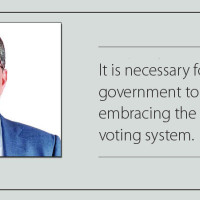- Wednesday, 11 February 2026
Grassroots Justice Through Paralegal Mechanism
Before Nepal's 2015 Constitution, Paralegal Committees (PLCs) were vital for community-based justice. Established in 1999 to combat human trafficking, these committees expanded their focus to address various rights violations affecting women and children. Supported by organisations such as UNDP, UNFPA, UN Women, and UNICEF, PLCs played a crucial role in enhancing access to justice through advocacy, mediation, and early intervention.
This article examines the establishment, effectiveness, and future integration of PLCs, emphasising their role in combating gender-based violence (GBV) and improving access to justice. It also discusses challenges faced by PLCs and offers recommendations for integrating them within the formal judicial framework.
Functionality
PLCs were instituted across 570 Village Development Committees (VDCs) in 23 districts, spanning the Eastern, Central, Western, Mid-Western, and Far-Western regions of Nepal, with assistance from UNICEF. Their functions included advocacy, public education, early detection, and intervention, case management through local mediation or referrals, and monitoring. Most PLC members were local volunteers, predominantly women, trained by the District Resource Group (DRG), comprising legal and community development professionals. The initial 18-day training covered women's and children's rights, legal barriers, the Nepali legal system, and skills in social mobilisation and mediation.
In 2008, UNICEF’s evaluation of the PLC programme led to efforts to expand the initiative within existing districts and secure funding for broader expansion. Collaborations with UNFPA and UNIFEM resulted in the formation of 60 new PLCs in four districts, including Kapilvastu, where UNICEF was already active. Simultaneously, UNDP facilitated the establishment of 70 PLCs in seven additional districts. The value of PLCs, particularly in addressing GBV, was recognised in strategic documents by the Prime Minister’s Office. In 2009, DFID allocated £6.51 million over three years (2009-2012) to extend the programme nationwide, aiming to increase the number of PLCs to 1,300 and cover one-third of Nepal’s population.
PLCs served as critical community-based mechanisms for addressing GBV and ensuring access to justice for women and children. By the end of 2008, there were 482 active PLCs providing mediation services to approximately 13,500 individuals. They addressed a wide range of disputes, resolving most cases locally while referring others to formal legal systems. Common issues included domestic violence, social violence, and property rights. PLCs empowered many women and raised awareness about domestic violence, child labor, and child marriage.
Despite their successes, PLCs face significant challenges. Initially informal, they lacked authority, hindering enforcement and recognition. However, PLCs have gained legitimacy through their effectiveness in addressing legal issues. While they possess a basic understanding of mediation, they must develop the essential skills required by the Mediation Act for formal registration to enhance their authority. Additionally, PLCs encounter threats from perpetrators of gender-based violence, undermining their efforts. A comprehensive impact assessment is needed to evaluate their effectiveness, particularly as cases involving children have received inadequate attention and resources.
Nepal's legal framework includes key statutes aimed at protecting women's rights and addressing GBV, including the Constitution of Nepal (2015), the Domestic Violence (Offence and Punishment) Act (2009), and the Human Trafficking and Transportation (Control) Act (2007). Nepal is a signatory to international treaties like CEDAW, CRC and other human rights related instruments, emphasising the necessity of addressing GBV and promoting gender equality.
The Supreme Court of Nepal has reinforced its commitment to women's rights through landmark decisions. In Prakash Mani Sharma vs Government of Nepal (2007) case, the Court mandated a compensation fund for victims of domestic violence. In Sapana Pradhan Malla vs Office of Prime Minister (2015), it emphasised the need for stronger measures to prevent workplace sexual harassment.
The introduction of a federal governance structure has rendered many PLCs inactive. Integrating and aligning PLCs with local judicial committees could enhance the protection of women's and children's rights. PLCs can facilitate case referrals, mediation, and early detection of gender-based violence (GBV), ensuring timely justice.
Challenges
However, PLCs face challenges such as lack of formal recognition, inadequate funding, and insufficient training. Recommendations to enhance their impact include increasing funding, providing regular training aligned with the Mediation Act's requirements, strengthening ties with legal institutions, and improving information management systems. Addressing these challenges will bolster Nepal's legal aid system and ensure accessible justice for all, especially women and marginalised communities.
PLCs are instrumental in addressing gender-based violence (GBV) and enhancing legal awareness in Nepal. Their community-based approach provides immediate support to victims and facilitates access to justice within the framework of the formal legal system. As Nepal transitions to a federal governance model and establishes local judicial committees, it is imperative to align paralegal committee programmes with these structures to ensure effective justice delivery.
By safeguarding victims' rights, dignity, confidentiality, and safety, PLCs advance the pursuit of justice in addressing GBV and promoting gender equality. Furthermore, they contribute to mitigating court case backlogs and uphold the legal principle that justice delayed is justice denied.
(The author is an advocate, notary public and development practitioner.)
















